BSc in Software Engineering
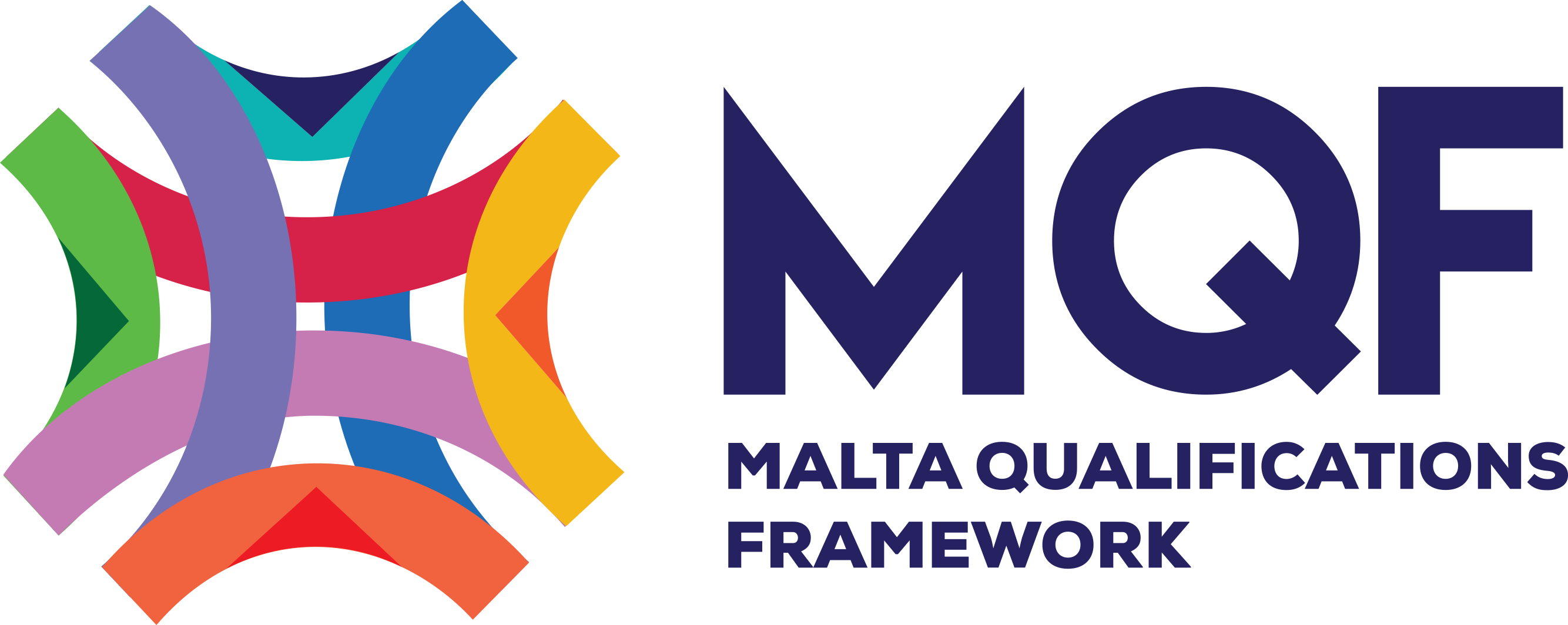
This Program is accredited by the MFHEA
Degree Overview for BSc in Software Engineering
The Bachelor of Science/BSc in Software Engineering is designed for students interested in software technologies, big data, artificial intelligence, human-computer interaction, project management and security within the broader field of software engineering. The programme focuses on introducing to programming, web and databases. It starts with core fundamentals such as web and object-oriented programming using Java, human-computer interaction, and then building on that knowledge, learning and practicing advanced software engineering methodologies, from agile to structured approaches used in large software projects. Further the programme deals with developing programming skills and addresses the engineering of large software systems and how to apply computing concepts to complex systems.
Entry Requirements for this Program
Entry requirements for Undergraduate program
To be eligible to register for a degree program an applicant must satisfy general entrance requirements as given in the Admissions of the university web site https://aum.edu.mt/admissions/ and AUM Catalogue.
All applicants are required to:
- Have proof of secondary school education (not less than 12 years of study)
- Provide proof of competence in English
- Provide proof of competence in Mathematics
- Application procedures
Online application: https://aum.edu.mt/admissions/
On-site application: Admissions Department, 2 FL, Room 211
III. Entry requirement documents for submission:
- Matriculation Certificate
- English Language Proficiency (IELTS -6.0 or above, TOEFL – PBT 550 or above iBT 79-80 or above CBT 213 or above)
- Secondary Education Certificate (SEC) examinations in English language, Maltese and Mathematics*, and A/S or A Levels: three subject exams with grades of A, B, C or D
- IB certificate
- other school leaving certificates
- SAT certificate
- Counsellor or teacher letter of recommendation
- Personal statement (if available)
- Application Form
PROGRAM DETAILS
Program length:
4 Years / Full-time.
GPA needed to earn the degree:
2.0 or higher
Credits needed to earn the degree:
120US credists / 240ECTS
Degree level:
MQF Level 6
Pass Rate:
73%
Overall Course Objectives
The aim of BSc in Software Engineering programme is to prepare learners to be able to design computer programs, develop software, use information technologies in data processing and solve problems in the industry, and keep up with the rapid change and development in computer technologies with the contribution of science and mathematics. The programme starts with core fundamentals and then builds on that knowledge the skills and competences required for advanced software engineering methodologies used in large software projects. The aim of the programme is to prepare learners to address the engineering of large software systems and to apply computing concepts to complex systems.
Knowledge
The learner will know:
- apply software technologies in various software projects
- use and interpret big data in software engineering
- define artificial intelligence in programming
- identify human-computer interaction in software engineering
- know requirements for project management in software engineering
- study security issues in the broader field of software engineering
- develop programming, web and databases, such as web and object-oriented programming using Java
- build knowledge by learning and practicing advanced software engineering methodologies, from agile to structured approaches used in large software projects
- how to apply computing concepts to complex systems.
Skills
The learner will be able to:
- identify and solve complex engineering problems by applying principles of engineering, science, and mathematics
- name the system development lifecycle
- interpret a wide range of principles and tools available to the software developer, such as software process methodologies, choice of algorithm, language, software libraries and user interface technique
- formulate the principles of object-oriented software construction
- know how to use the software-development process, including requirements analysis, design, programming, testing and maintenance
- list the range of situations in which computer systems are used, the ways in which people interact with them
- describe professional issues to cover social, ethical and legal aspects
- use communication issues in large, complex software projects
- interpret and use the principles and techniques of a number of application areas informed by the research directions of the subject, such as software engineering, net-centric, and distributed systems.
General Pedagogical Methods
For online classes, faculty will deliver online video lectures that are identical in content as face-to-face classes. Educational videos will be linked from academic resources licensed through the AUM Library (e.g. Business Source Complete, and other databases). If appropriate, faculty can also utilize selected VOD such as Netflix, or Apple TV to incorporate in lectures.
For the academic support, the VLE and SIS system will be the main channels of the communication for student-tutor engagement. Technical support -ticketing system- will be available 24/7 in both platforms.
In general, the program addresses the real-world needs of industry through special, topic-based classes. Courses are taught with a mixture of theory and applied practice. The teaching method follows the standard classroom model in which the primary mode of instruction is lectures, lab exercise (practical for programming), and engagement with students through discussion. The instructor provides material, including where appropriate videos, for the students to study outside of class. In class and lectures to clarify the material, the instructor leads in-class exercises (problems, design projects, instructing on software, programming languages, discussions, etc.). Besides, computer lab-based sessions will enable students to comprehend the fundamentals discussed in the class and acquire hands-on in using and applying learned concepts through computer programming problem solving and relevant works. Out of class reading and homework assignments are regularly assigned, submitted, and graded. Students also can engage in one-to-one instruction through office hours given by the course (module) instructor. The pedagogical approaches vary substantially from module to module and are described in detail in each module’s description in Section D.
GENERAL ASSESSMENT POLICY AND PROCEDURES
Students require to maintain a minimum GPA of 2.0 throughout the course—the failure to maintain such a standard may result in academic probation.
A student in academic probation can continue to enrol in new modules for two semesters, while the student is strongly encouraged to retake modules in which grades were unsatisfactory. If the GPA does not reach the required threshold after two semesters of academic probation, the student may be dismissed from the program.
Students are required to obtain a grade of C- or better in each of the course modules outside of the General Education Component. If a student receives a grade below C-, the students must retake the module to graduate.
Assessment
This program requires mathematical and analytical skills. Assessments (in-class examinations, homework, and individual and team projects) will focus on those skills. In general, grades will be assigned based on performance on those assessments.
Students with learning disabilities will be addressed. Additional time or quiet settings will be provided for examinations for those students as determined appropriate.
Anyway, assessment procedures vary substantially from module to module and are described in detail in each module’s description.
Cheating and Plagiarism
Exams will be administered in classroom settings by the instructor. Appropriate identification will be required. Class notes or limited sets of materials may be available to students during exams. Only simple calculators without memory cards will be permitted to avoid students bringing additional materials to assessments. Turnitin’s plagiarism tool will be applied to document reports and papers are not copied from other sources without proper citation. If the similarity report exceeds 20%, the instructor will investigate the reports/documents and act as AUM policy.
COURSE STRUCTURE SAMPLE
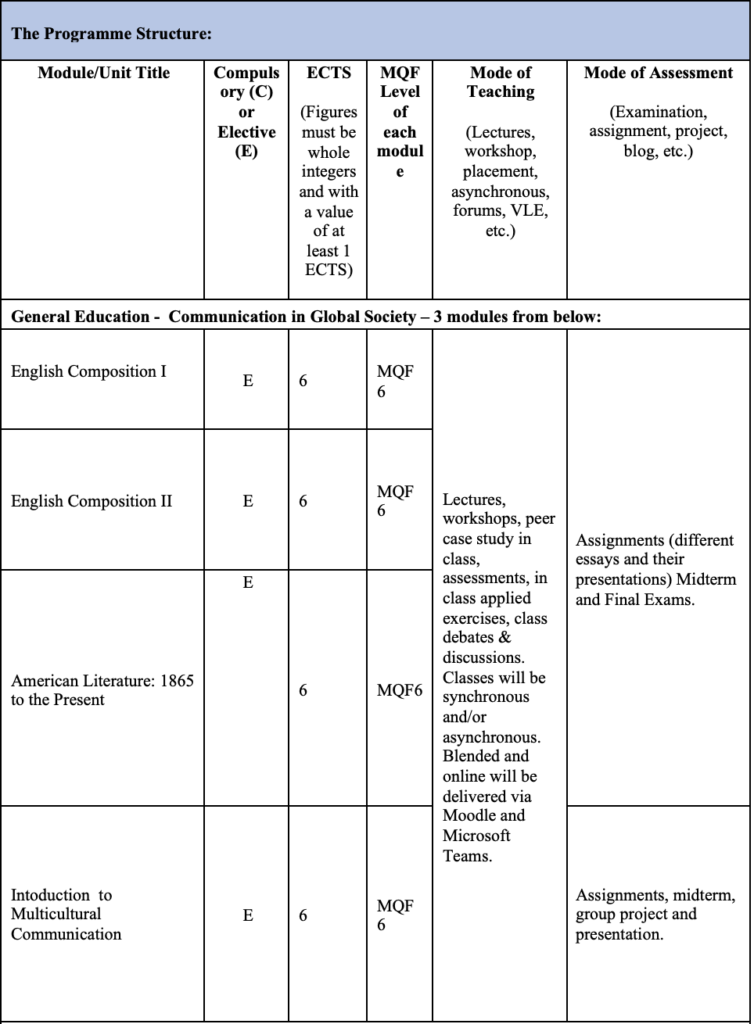
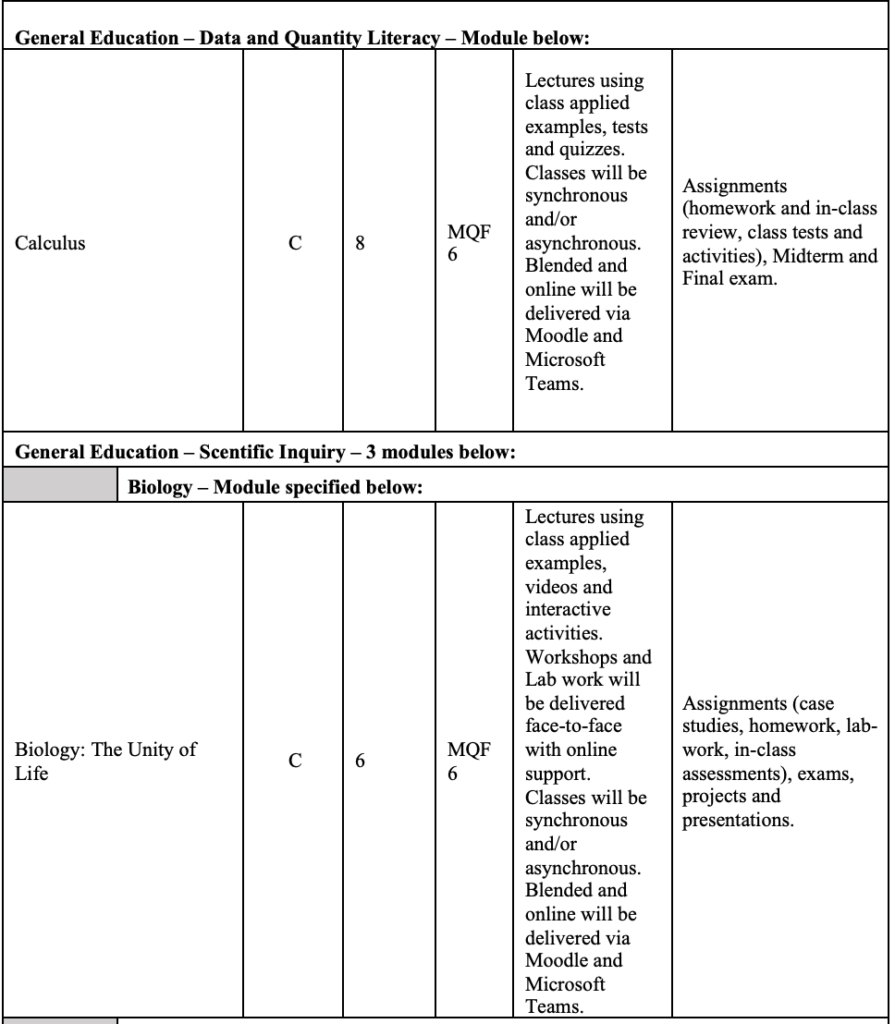
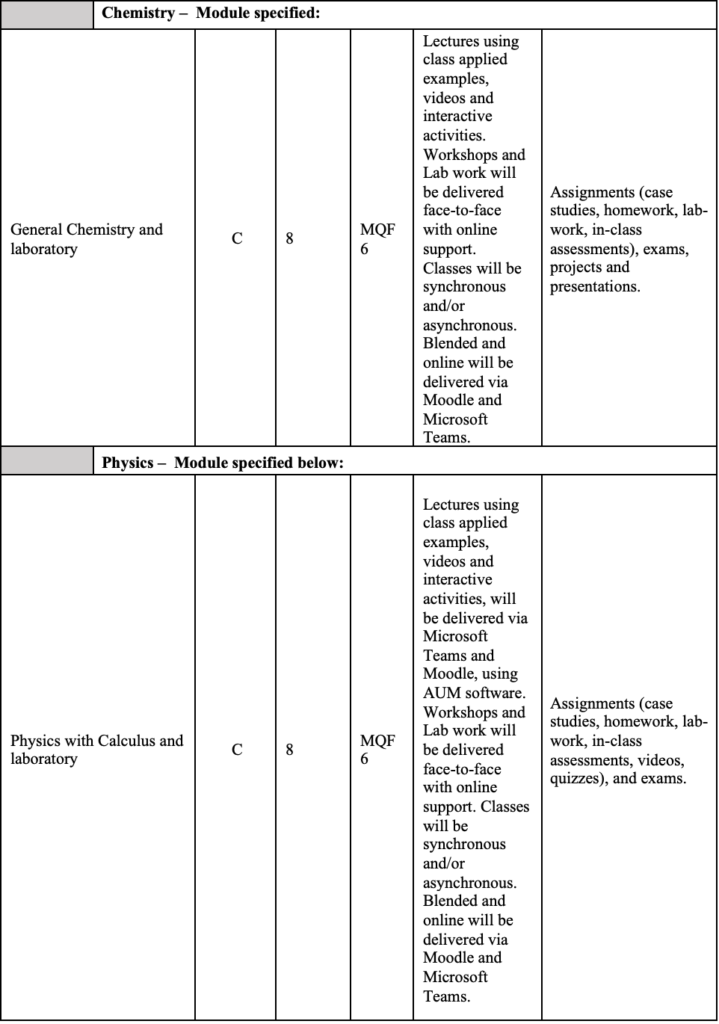
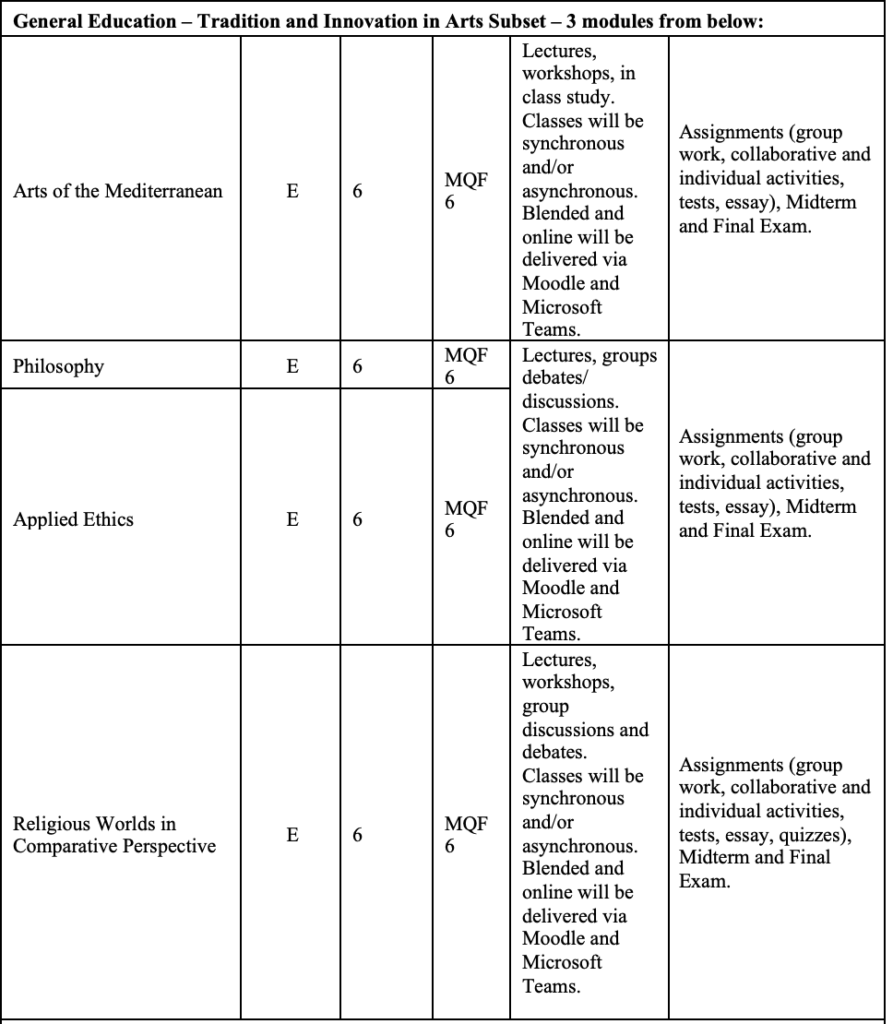
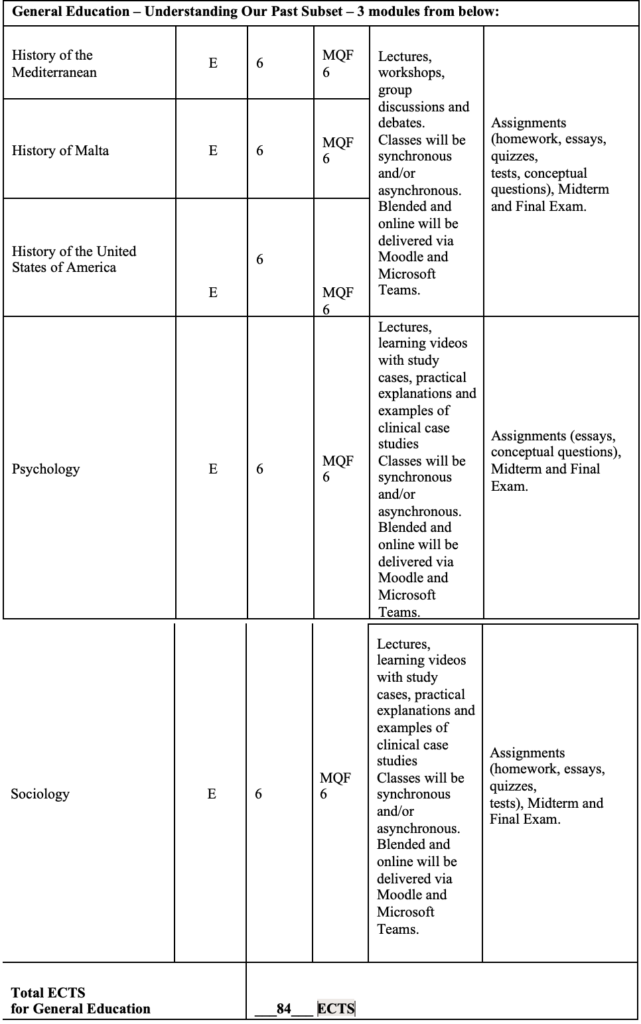
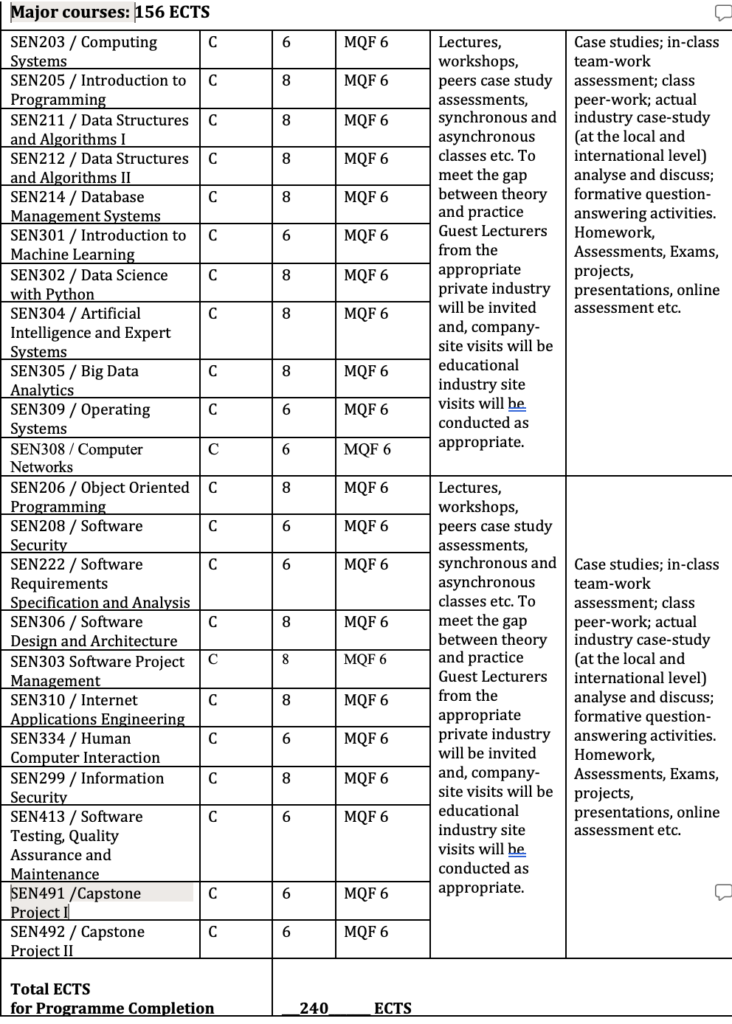
MODE OF ATTENDANCE
Full time
Semester 1
ENG 101 English Composition I (6 ECTS)
MAT 101 Introduction to Data Analysis, Probability and Statistics (6 ECTS)
CHE 111 Introduction to General Chemistry I (8 ECTS)
REL 101 Religious Worlds in Comparative Perspective (6 ECTS)
SEN 203 Computing Systems (6 ECTS)
Semester 2
ENG 102 English Composition II (6 ECTS)
PHY 111 Physics with Calculus I and lab (8 ECTS)
HIS 101 History of the Mediterranean (6 ECTS)
SEN 205 Introduction to Programming (8 ECTS)
Semester 3
BIO 101 Unity of Life (8 ECTS)
ATH101 Introduction to the Arts of the Mediterranean (6 ECTS)
PHI 102 Introduction to Applied Ethics (6 ECTS)
SEN 211 Data Structures and Algorithms I (8 ECTS)
Semester 4
COM 101 Introduction to Multicultural Communication (6 ECTS)
SOC 101 Introduction to Sociology (6 ECTS)
PSY101 Introduction to Psychology (6 ECTS)
SEN 206 Object Oriented Programming (8 ECTS)
SEN309 Operating Systems (6 ECTS)
Semester 5
SEN 212 Data Structures and Algorithms II (8 ECTS)
SEN 214 Database Management Systems (8 ECTS)
SEN304 Artificial Intelligence and Expert Systems (8 ECTS)
SEN306 Software Design and Architecture (8 ECTS)
Semester 6
SEN305 Big Data Analytics (8 ECTS)
SEN 222 Software Requirements Specification and Analysis (6 ECTS)
SEN 301 Introduction to Machine Learning (6 ECTS)
SEN303 Software Project Management (8 ECTS)
Semester 7
SEN413 Software Testing, Quality Assurance and Maintenance (6 ECTS)
SEN 302 Data Science with Python (8 ECTS)
SEN491 Capstone Project I (6 ECTS)
SEN310 Internet Applications Engineering (8 ECTS)
Semester 8
SEN 208 Software Security (6 ECTS)
SEN299 Information Security (8 ECTS)
SEN334 Human Computer Interaction (6 ECTS)
SEN308 Computer Networks (6 ECTS)
SEN492 Capstone Project II (6 ECTS)
Part-time
Semester 1
ENG 101 English Composition I (6 ECTS)
MAT 101 Introduction to Data Analysis, Probability and Statistics (6 ECTS)
CHE 111 Introduction to General Chemistry I (8 ECTS)
Semester 2
REL 101 Religious Worlds in Comparative Perspective (6 ECTS)
SEN 203 Computing Systems (6 ECTS)
ENG 102 English Composition II (6 ECTS)
Semester 3
PHY 111 Physics with Calculus I and lab (8 ECTS)
HIS 101 History of the Mediterranean (6 ECTS)
SEN 205 Introduction to Programming (8 ECTS)
Semester 4
BIO 101 Unity of Life (8 ECTS)
ATH101 Introduction to the Arts of the Mediterranean (6 ECTS)
PHI 102 Introduction to Applied Ethics (6 ECTS)
Semester 5
SEN 211 Data Structures and Algorithms I (8 ECTS)
COM 101 Introduction to Multicultural Communication (6 ECTS)
SOC 101 Introduction to Sociology (6 ECTS)
Semester 6
PSY101 Introduction to Psychology (6 ECTS)
SEN 206 Object Oriented Programming (8 ECTS)
SEN309 Operating Systems (6 ECTS)
Semester 7
SEN 212 Data Structures and Algorithms II (8 ECTS)
SEN 214 Database Management Systems (8 ECTS)
SEN304 Artificial Intelligence and Expert Systems (8 ECTS)
Semester 8
SEN306 Software Design and Architecture (8 ECTS)
SEN305 Big Data Analytics (8 ECTS)
SEN 222 Software Requirements Specification and Analysis (6 ECTS)
Semester 9
SEN 301 Introduction to Machine Learning (6 ECTS)
SEN303 Software Project Management (8 ECTS)
SEN413 Software Testing, Quality Assurance and Maintenance (6 ECTS)
Semester 10
SEN 302 Data Science with Python (8 ECTS)
SEN310 Internet Applications Engineering (8 ECTS)
SEN 208 Software Security (6 ECTS)
Semester 11
SEN299 Information Security (8 ECTS)
SEN334 Human Computer Interaction (6 ECTS)
SEN491 Capstone Project I (6 ECTS)
Semester 12
SEN308 Computer Networks (6 ECTS)
SEN492 Capstone Project II (6 ECTS)
OTHER QUALIFICATIONS
Graduate Diploma in Software Development
Number of ECTS: 60
MQF level: MQF 6
Courses:
- SEN203 Computing Systems (6 ECTS)
- SEN205 Introduction to Programming (8 ECTS)
- SEN206 Object Oriented Programming (8 ECTS)
- SEN214 Database Management Systems (8 ECTS)
- SEN211 Data Structures and Algorithms I (8 ECTS)
- SEN212 Data Structures and Algorithms II (8 ECTS)
- SEN222 Software Requirements Specification and Analysis (6 ECTS)
- SEN310 Internet Applications Engineering (8 ECTS)
Graduate Certificate in Basic Data Science
Number of ECTS: 30
MQF level: MQF 6
Courses:
- SEN301 Introduction to Machine Learning (6 ECTS)
- SEN302 Data Science with Python (8 ECTS)
- SEN304 Artificial Intelligence and Expert Systems (8 ECTS)
- SEN305 Big Data Analytics (8 ECTS)